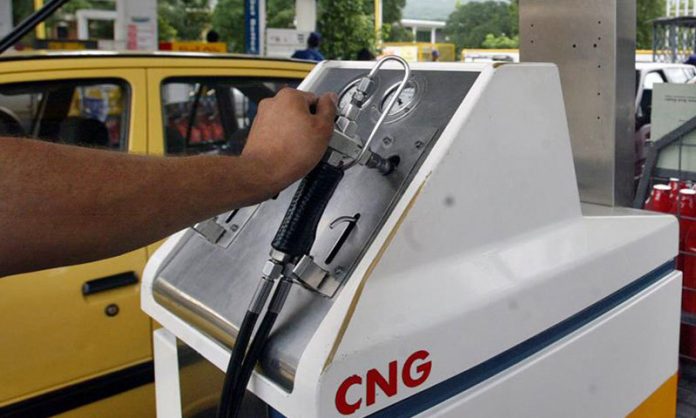ISLAMABAD: The federal government on its second-last day in office on Wednesday lifted the ban on import of compressed natural gas (CNG) cylinders and kits after eight years while reducing customs duties on the equipment. The move may be seen as encouraging CNG as an auto fuel substitute for the public as international oil prices seem to be surging.
Headed by Prime Minister Shahid Khaqan Abbasi the Economic Coordination Committee (ECC) meeting at the Prime Minister’s office took the decision.
The ECC decided to relax the ban on import of CNG cylinders and kits and allow authorised dealers to import CNG cylinders/kits.
It also decided to reduce customs duties on imported kits and cylinders.
The government slapped a ban on import of CNG cylinders and kits in 2011 in an antithesis to its policy of promoting green fuel. Till then, around four million cars and buses were switched to CNG, which was more than 30 percent inexpensive than gasoline. Last month, international oil prices climbed as high as over $75/barrel in April – the levels which were not seen since November 2014. The price recovery exerted pressure on Pakistan that saw oil imports jump 30 percent to $11 billion in July-April FY2018.
The meeting also discussed the issue of sub-standard CNG cylinders/kits, flourishing roadside CNG conversions by unskilled workers and enforcement of inspection/testing of CNG vehicle cylinders and kits.
The ECC also permitted Inter State Gas System (Pvt) Limited to construct a pipeline connecting the liquefied natural gas (LNG) regasification terminal at Sonmiani, namely Bahria Foundation LNG terminal project to Nawabshah. The pipeline would be capable of transporting 700 to 1,200 million metric cubic feet/day high-pressure re-gasified LNG, which will further be transported to the north of the country. The committee said the project will play a key role in mitigating energy crises and creating job opportunities.
The ECC also accepted a proposal of petroleum division for adjustment of margin on LNG to mitigate the higher incidence of tax on LNG. The meeting also allowed Pakistan LNG Limited (PLL) to use the existing government guarantee of $150 million for the issuance of a letter of credit/standby letter of credit facility. The facility would enable PLL to procure LNG on mid to long-term basis.
The meeting further discussed the impact of the Prime Minister’s export package, announced in January 2017, to enhance the country’ exports. It said the incentive package has significantly contributed towards a turnaround in exports in FY2018, which had been continuously declining since FY2014. It was informed exports registered increased 14 percent during July-April 2017/18 compared with the corresponding period of the previous year. The ECC decided to continue export incentive package in order to maintain growth momentum, improve competitiveness and incentivise investment in export-oriented production.
It was decided to extend drawback of local taxes and levies (DLTL), on the same terms and conditions, for the commercial and manufacturer exporters for another three years.
The package would include the existing and new non-textile sectors allowing them DLTL at the reduced rate.
The ECC approved an amendment into Section 19 of the Customs Act 1969, Sales Tax Act 1990 and Income Tax Ordinance 2001 for providing enabling legislation to extend incentives under the Pioneer Industry Policy.
The ECC considered issues in the applicability of a statutory regulatory order (SRO 1067(I)/2017) due to limited human resource and capacity constraints of Department of Plant Protection (DPP).
It was decided that the import of various food items as listed in the SRO would only be allowed at Karachi sea port, and land border posts at Sost, Chaman, Torkham, Taftan, Wagha, Peshawar and Quetta till the DPP raised the required human resource with necessary technical capacity to handle inspection work at other ports of the country.




